外研版(2019)必修第三册Unit 1 Knowing Me, Knowing You Developing ideas 课件(共22张PPT)
文档属性
| 名称 | 外研版(2019)必修第三册Unit 1 Knowing Me, Knowing You Developing ideas 课件(共22张PPT) | 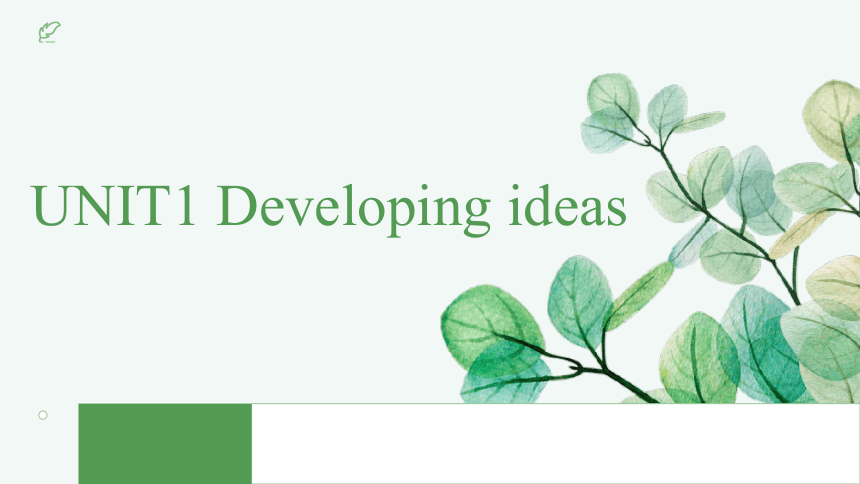 | |
| 格式 | pptx | ||
| 文件大小 | 2.2MB | ||
| 资源类型 | 教案 | ||
| 版本资源 | 外研版(2019) | ||
| 科目 | 英语 | ||
| 更新时间 | 2024-05-22 14:56:45 | ||
图片预览

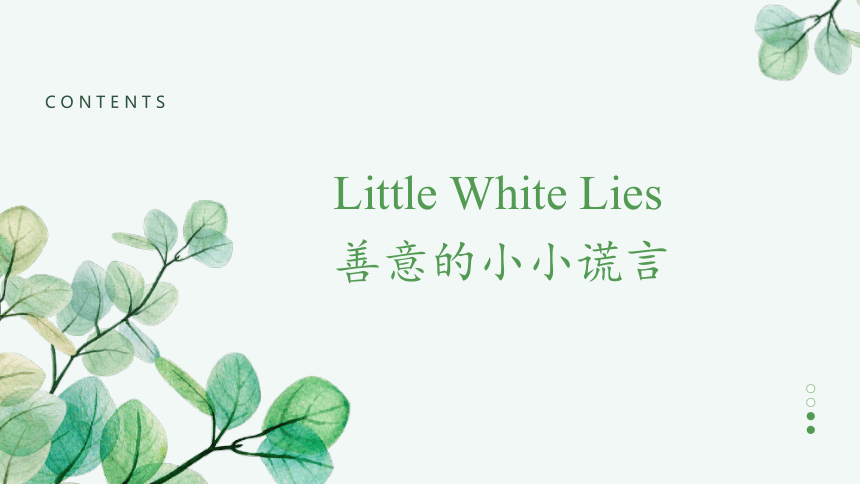
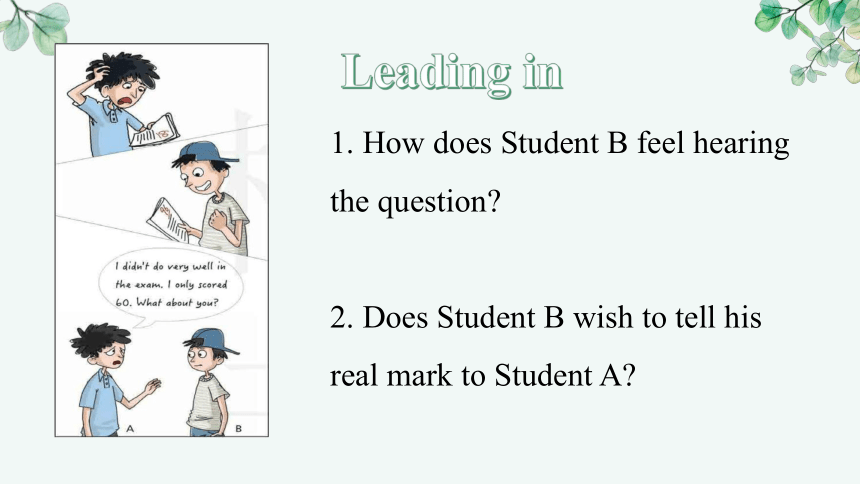
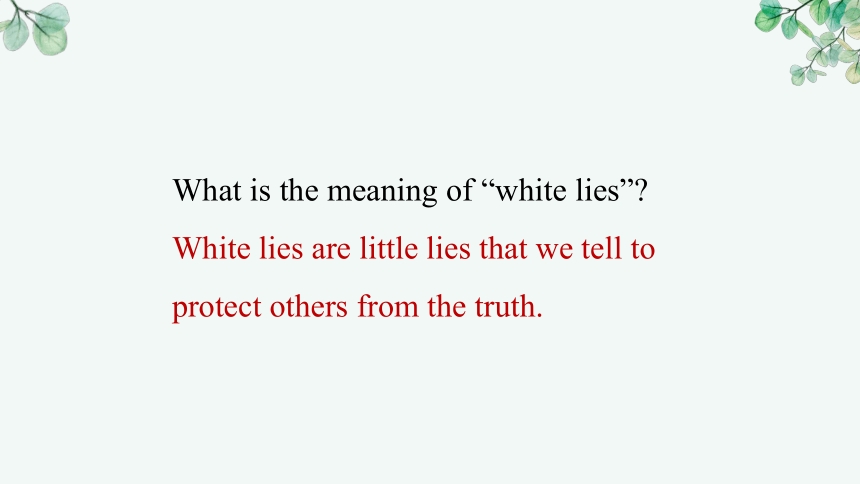
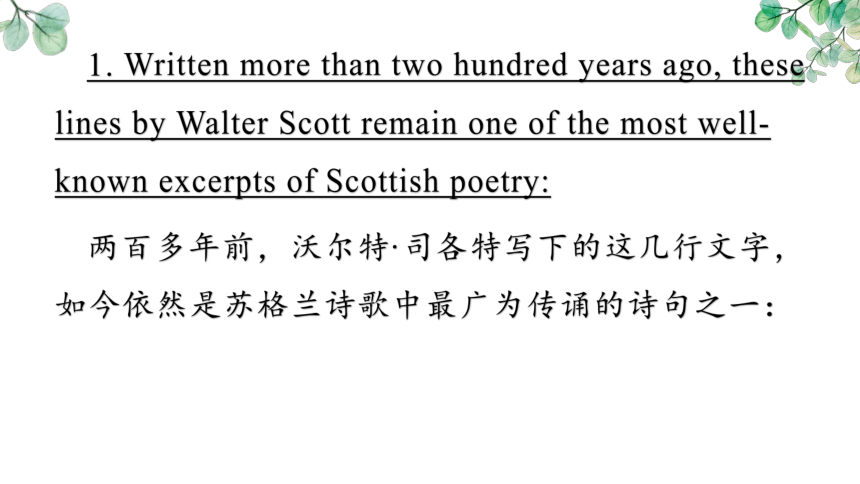
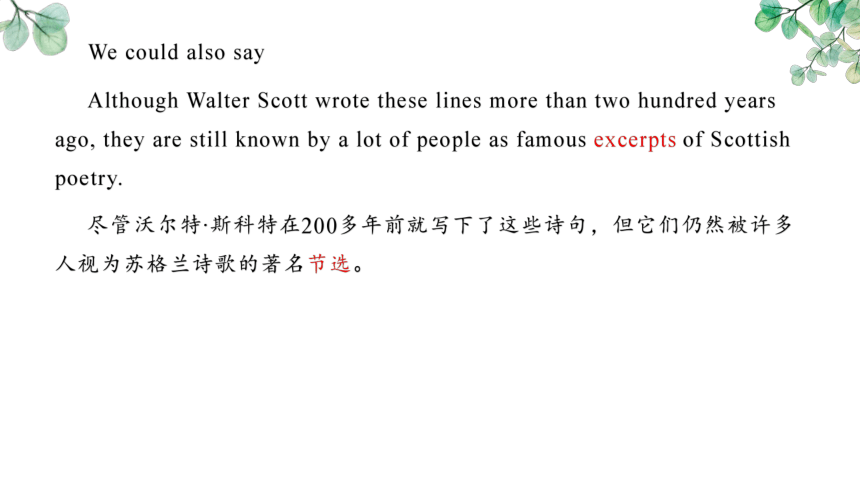
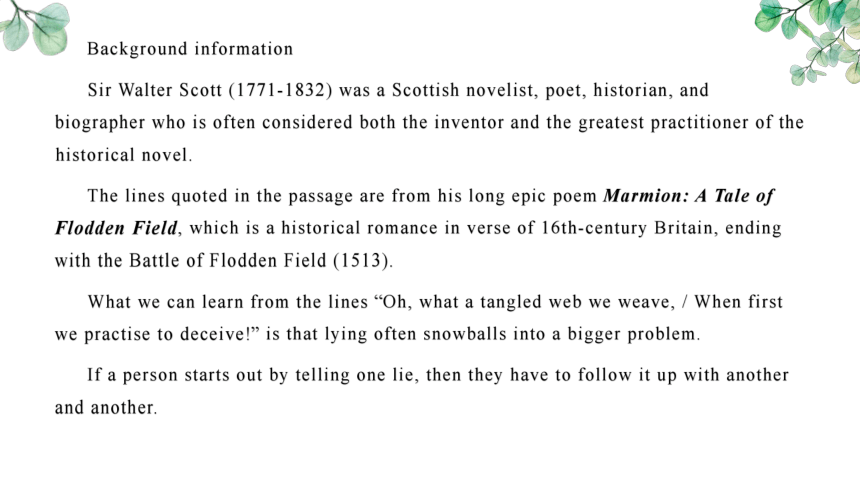
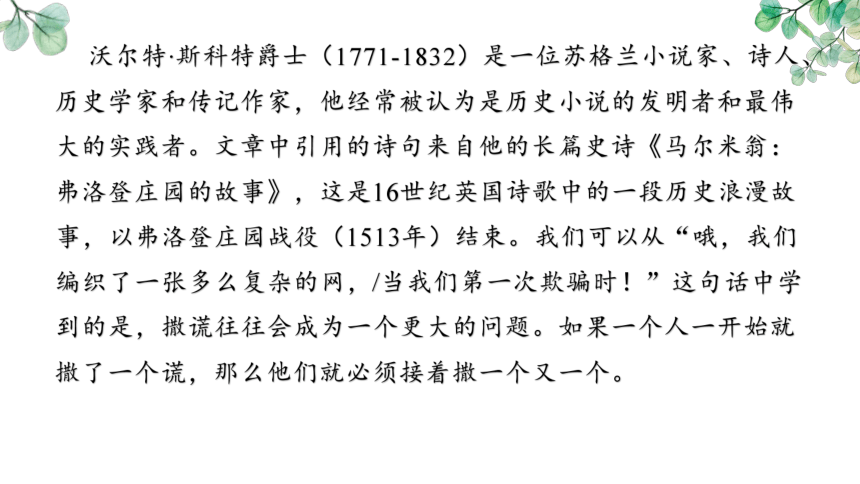
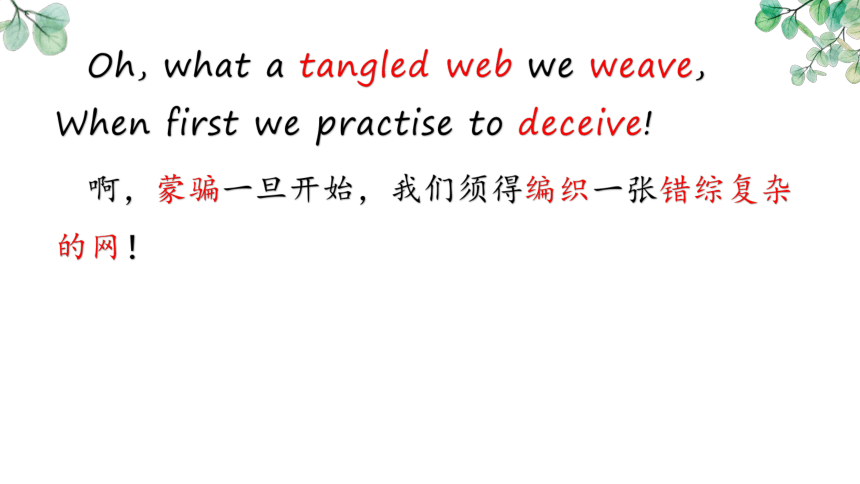
文档简介
(共22张PPT)
UNIT1 Developing ideas
Little White Lies
善意的小小谎言
1. How does Student B feel hearing the question
2. Does Student B wish to tell his real mark to Student A
Leading in
What is the meaning of “white lies”
White lies are little lies that we tell to protect others from the truth.
1. Written more than two hundred years ago, these lines by Walter Scott remain one of the most well-known excerpts of Scottish poetry:
两百多年前,沃尔特·司各特写下的这几行文字,如今依然是苏格兰诗歌中最广为传诵的诗句之一:
We could also say
Although Walter Scott wrote these lines more than two hundred years ago, they are still known by a lot of people as famous excerpts of Scottish poetry.
尽管沃尔特·斯科特在200多年前就写下了这些诗句,但它们仍然被许多人视为苏格兰诗歌的著名节选。
Background information
Sir Walter Scott (1771-1832) was a Scottish novelist, poet, historian, and biographer who is often considered both the inventor and the greatest practitioner of the historical novel.
The lines quoted in the passage are from his long epic poem Marmion: A Tale of Flodden Field, which is a historical romance in verse of 16th-century Britain, ending with the Battle of Flodden Field (1513).
What we can learn from the lines “Oh, what a tangled web we weave, / When first we practise to deceive!” is that lying often snowballs into a bigger problem.
If a person starts out by telling one lie, then they have to follow it up with another and another.
沃尔特·斯科特爵士(1771-1832)是一位苏格兰小说家、诗人、历史学家和传记作家,他经常被认为是历史小说的发明者和最伟大的实践者。文章中引用的诗句来自他的长篇史诗《马尔米翁:弗洛登庄园的故事》,这是16世纪英国诗歌中的一段历史浪漫故事,以弗洛登庄园战役(1513年)结束。我们可以从“哦,我们编织了一张多么复杂的网,/当我们第一次欺骗时!”这句话中学到的是,撒谎往往会成为一个更大的问题。如果一个人一开始就撒了一个谎,那么他们就必须接着撒一个又一个。
Oh, what a tangled web we weave, When first we practise to deceive!
啊,蒙骗一旦开始,我们须得编织一张错综复杂的网!
2. We all know that honesty is an important value and that lying is wrong, but who can honestly say that they’ve never told a lie Perhaps we comfort ourselves with the knowledge that most of the lies we tell are “white lies”: little lies that we tell to protect others from the truth.
我们都知道诚实是一项重要品质,也知道说谎是不对的,但是谁又能诚实地说自己从未说过谎呢?也许我们会这样来安慰自己:我们所说的大部分谎言都是“善意的谎言”——我们为了保护他人免受真相伤害的小谎言。
3. We’ve all surely had the experience of someone cooking a meal for us that we don’t like. The majority of us of course don’t tell the truth—we lie and say that the food is “delicious”.
我们一定都有过这样的经历:别人为我们准备的饭菜不合我们的口味。我们大多数人当然不会说实话——我们会撒谎说食物“很美味”。
4. Or if a friend asks us what we think of their new haircut, we say “It’s great!”, even if we think it’s awful. But to what extent can we justify telling white lies like these
或者有朋友问我们他的新发型怎么样,即使我们觉得很糟糕,我们也还是会说:“太棒了!”但是,我们能在多大程度上 证明说这些善意的谎言是合理的呢?
to what extent: to the degree or limit of something
达到某物的程度或限度
e.g. To what extent does concern for others influence the choices you make
对他人的关心在多大程度上影响了你的选择?
5. One of the main reasons for telling a white lie is to try to make others feel better. However, when we lie and say that someone’s haircut looks good, or when we say that we love a meal that we secretly hate, are we really hoping to improve the situation for someone else Perhaps we are in fact lying to protect ourselves from the disappointment and anger of others.
说善意谎言的一个主要原因是为了照顾别人的感受。然而,当我们撒谎说某人的发型很好看,或者说不合我们口味的菜很好吃时,我们真的是在为别人着想吗?也许实际上,我们撒谎只是为了不让别人失望和生气,以免殃及自身。
6. Another reason for telling a white lie is to give encouragement. Say for example that your friend asks you what you think of his singing. You of course say that it’s wonderful, despite secretly thinking that your cat can sing better. Stop for a moment and consider that perhaps your friend wants some frank comments from you so that they can improve. Or perhaps, they need to know that they should look for a different hobby.
说善意谎言的另一个原因是给予鼓励。比方说,你的朋友问你觉得他的歌唱得怎么样。尽管你私下里认为他唱得还不如猫叫好听,但你还说会说这很好听。停下来想一想,也许你的朋友就是想从你那儿得到一些坦诚的意见,从而改进和提高。又或者,应该让他知道自己应该换一个爱好了。
7. Finally, we may also tell a white lie when we want to protect others from bad news. If you’ve had a bad day, do you tell your parents about it, or do you hide your tears and lie that your day was “fine” If the latter, don’t you think your parents would want to listen to you and understand your feelings Wouldn’t it be better to respect their concern for you and ask for their advice
最后,想要向别人隐瞒坏消息的时,我们也可能会说善意的谎言。假如你今天诸事不顺,你是对你的父母说实话呢,还是会偷偷擦掉眼泪骗他们说你今天过得“很好”?如果是后者,难道你不觉得其实父母希望听你倾诉从而理解你的真实感受吗?尊重他们对你的关心,向他们寻求建议不是更好吗?
8. Going back to Walter Scott’s lines, we may find even white lies have results we cannot know in advance. Perhaps the meal you said was “delicious” will be served every time you visit. Would your friend trust your opinion again if he found out you had lied about his “wonderful” singing How would you expect others to truly understand your emotions if you only shared good news instead of bad Moreover, how would you feel if you discovered that the people closest to you had been hiding the truth from you
回到沃尔特·司各特的诗句,我们可能会发现,即使是善意的谎言,也会带来无法预知的后果。也许被你评价为“美味的”饭菜会在你每次到访时都出现在餐桌上。如果你的朋友发现你对歌声“很美妙”的评价是个谎言后,他还会继续信任你的看法吗?如果你只分享好消息而隐瞒坏消息,你又怎么能指望别人真正理解你的情绪呢?而且,如果你发现身边最亲近的人对你隐瞒了真相,你又会作何感想?
Introduction
We know lying is wrong, so why do we tell white lies
Main body
Reason 1: To make others feel better.
Example (s)
Someone's cooking a meal for us that we don't like. The majority of us don't tell the truth - we lie and say that the food is "delicious".
Someone's haircut is awful, but we say "It's great!".
Analysis
Perhaps we lie to protect ourselves from the disappointment and anger of others.
Reason 2
To give encouragement.
Example (s)
You say your friend's singing is wonderful, despite secretly thinking that your cat can sing better.
Analysis
Perhaps your friend wants some frank comments from you so that they can improve.
Perhaps they need to know that they should look for a different hobby.
Reason 3: To protect others from bad news.
Example (s)
You've had a bad day, but you hide your tears and lie to your parents that your day was "fine".
Analysis
Perhaps your parents would want to listen to you and understand your feelings.
Conclusion
Even white lies may have results we cannot predict. So we should not tell lies even if they are white lies.
Honesty is an important value and lying is wrong.
An essay usually consists of three parts: introduction, main body and conclusion.
Start with an introduction that contains the aims and an overview of the essay. The main body of an essay is a series of paragraphs that explore and develop your argument.
The conclusion contains a summary of your ideas — do not introduce any new material here! End your essay by linking your conclusion back to the essay title.
Learning to learn
THE END
UNIT1 Developing ideas
Little White Lies
善意的小小谎言
1. How does Student B feel hearing the question
2. Does Student B wish to tell his real mark to Student A
Leading in
What is the meaning of “white lies”
White lies are little lies that we tell to protect others from the truth.
1. Written more than two hundred years ago, these lines by Walter Scott remain one of the most well-known excerpts of Scottish poetry:
两百多年前,沃尔特·司各特写下的这几行文字,如今依然是苏格兰诗歌中最广为传诵的诗句之一:
We could also say
Although Walter Scott wrote these lines more than two hundred years ago, they are still known by a lot of people as famous excerpts of Scottish poetry.
尽管沃尔特·斯科特在200多年前就写下了这些诗句,但它们仍然被许多人视为苏格兰诗歌的著名节选。
Background information
Sir Walter Scott (1771-1832) was a Scottish novelist, poet, historian, and biographer who is often considered both the inventor and the greatest practitioner of the historical novel.
The lines quoted in the passage are from his long epic poem Marmion: A Tale of Flodden Field, which is a historical romance in verse of 16th-century Britain, ending with the Battle of Flodden Field (1513).
What we can learn from the lines “Oh, what a tangled web we weave, / When first we practise to deceive!” is that lying often snowballs into a bigger problem.
If a person starts out by telling one lie, then they have to follow it up with another and another.
沃尔特·斯科特爵士(1771-1832)是一位苏格兰小说家、诗人、历史学家和传记作家,他经常被认为是历史小说的发明者和最伟大的实践者。文章中引用的诗句来自他的长篇史诗《马尔米翁:弗洛登庄园的故事》,这是16世纪英国诗歌中的一段历史浪漫故事,以弗洛登庄园战役(1513年)结束。我们可以从“哦,我们编织了一张多么复杂的网,/当我们第一次欺骗时!”这句话中学到的是,撒谎往往会成为一个更大的问题。如果一个人一开始就撒了一个谎,那么他们就必须接着撒一个又一个。
Oh, what a tangled web we weave, When first we practise to deceive!
啊,蒙骗一旦开始,我们须得编织一张错综复杂的网!
2. We all know that honesty is an important value and that lying is wrong, but who can honestly say that they’ve never told a lie Perhaps we comfort ourselves with the knowledge that most of the lies we tell are “white lies”: little lies that we tell to protect others from the truth.
我们都知道诚实是一项重要品质,也知道说谎是不对的,但是谁又能诚实地说自己从未说过谎呢?也许我们会这样来安慰自己:我们所说的大部分谎言都是“善意的谎言”——我们为了保护他人免受真相伤害的小谎言。
3. We’ve all surely had the experience of someone cooking a meal for us that we don’t like. The majority of us of course don’t tell the truth—we lie and say that the food is “delicious”.
我们一定都有过这样的经历:别人为我们准备的饭菜不合我们的口味。我们大多数人当然不会说实话——我们会撒谎说食物“很美味”。
4. Or if a friend asks us what we think of their new haircut, we say “It’s great!”, even if we think it’s awful. But to what extent can we justify telling white lies like these
或者有朋友问我们他的新发型怎么样,即使我们觉得很糟糕,我们也还是会说:“太棒了!”但是,我们能在多大程度上 证明说这些善意的谎言是合理的呢?
to what extent: to the degree or limit of something
达到某物的程度或限度
e.g. To what extent does concern for others influence the choices you make
对他人的关心在多大程度上影响了你的选择?
5. One of the main reasons for telling a white lie is to try to make others feel better. However, when we lie and say that someone’s haircut looks good, or when we say that we love a meal that we secretly hate, are we really hoping to improve the situation for someone else Perhaps we are in fact lying to protect ourselves from the disappointment and anger of others.
说善意谎言的一个主要原因是为了照顾别人的感受。然而,当我们撒谎说某人的发型很好看,或者说不合我们口味的菜很好吃时,我们真的是在为别人着想吗?也许实际上,我们撒谎只是为了不让别人失望和生气,以免殃及自身。
6. Another reason for telling a white lie is to give encouragement. Say for example that your friend asks you what you think of his singing. You of course say that it’s wonderful, despite secretly thinking that your cat can sing better. Stop for a moment and consider that perhaps your friend wants some frank comments from you so that they can improve. Or perhaps, they need to know that they should look for a different hobby.
说善意谎言的另一个原因是给予鼓励。比方说,你的朋友问你觉得他的歌唱得怎么样。尽管你私下里认为他唱得还不如猫叫好听,但你还说会说这很好听。停下来想一想,也许你的朋友就是想从你那儿得到一些坦诚的意见,从而改进和提高。又或者,应该让他知道自己应该换一个爱好了。
7. Finally, we may also tell a white lie when we want to protect others from bad news. If you’ve had a bad day, do you tell your parents about it, or do you hide your tears and lie that your day was “fine” If the latter, don’t you think your parents would want to listen to you and understand your feelings Wouldn’t it be better to respect their concern for you and ask for their advice
最后,想要向别人隐瞒坏消息的时,我们也可能会说善意的谎言。假如你今天诸事不顺,你是对你的父母说实话呢,还是会偷偷擦掉眼泪骗他们说你今天过得“很好”?如果是后者,难道你不觉得其实父母希望听你倾诉从而理解你的真实感受吗?尊重他们对你的关心,向他们寻求建议不是更好吗?
8. Going back to Walter Scott’s lines, we may find even white lies have results we cannot know in advance. Perhaps the meal you said was “delicious” will be served every time you visit. Would your friend trust your opinion again if he found out you had lied about his “wonderful” singing How would you expect others to truly understand your emotions if you only shared good news instead of bad Moreover, how would you feel if you discovered that the people closest to you had been hiding the truth from you
回到沃尔特·司各特的诗句,我们可能会发现,即使是善意的谎言,也会带来无法预知的后果。也许被你评价为“美味的”饭菜会在你每次到访时都出现在餐桌上。如果你的朋友发现你对歌声“很美妙”的评价是个谎言后,他还会继续信任你的看法吗?如果你只分享好消息而隐瞒坏消息,你又怎么能指望别人真正理解你的情绪呢?而且,如果你发现身边最亲近的人对你隐瞒了真相,你又会作何感想?
Introduction
We know lying is wrong, so why do we tell white lies
Main body
Reason 1: To make others feel better.
Example (s)
Someone's cooking a meal for us that we don't like. The majority of us don't tell the truth - we lie and say that the food is "delicious".
Someone's haircut is awful, but we say "It's great!".
Analysis
Perhaps we lie to protect ourselves from the disappointment and anger of others.
Reason 2
To give encouragement.
Example (s)
You say your friend's singing is wonderful, despite secretly thinking that your cat can sing better.
Analysis
Perhaps your friend wants some frank comments from you so that they can improve.
Perhaps they need to know that they should look for a different hobby.
Reason 3: To protect others from bad news.
Example (s)
You've had a bad day, but you hide your tears and lie to your parents that your day was "fine".
Analysis
Perhaps your parents would want to listen to you and understand your feelings.
Conclusion
Even white lies may have results we cannot predict. So we should not tell lies even if they are white lies.
Honesty is an important value and lying is wrong.
An essay usually consists of three parts: introduction, main body and conclusion.
Start with an introduction that contains the aims and an overview of the essay. The main body of an essay is a series of paragraphs that explore and develop your argument.
The conclusion contains a summary of your ideas — do not introduce any new material here! End your essay by linking your conclusion back to the essay title.
Learning to learn
THE END
